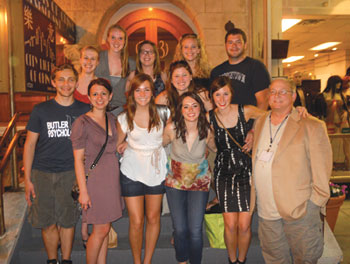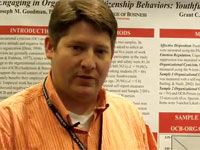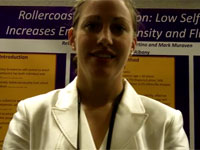Bringing Psychological Science to Life

Each year John N. Bohannon (far right) brings students from Butler University to present at the APS Convention. The Convention is also a family affair for him.
APS is one of the best meetings I attend, for several reasons. First, it is a great cross section of the science of our discipline: clinical, social, cognitive, developmental, I/O and neuroscience.
I love having the opportunity to discover new ideas and meet fellow researchers. Two such events happened in Washington, DC. First, David Diamond presented his time-based neuro-model of emotional memory formation with a mechanism explaining why some memories may seem fragmented. My lab of 12 undergraduates now has a new set of required readings!
Second, after many years of covering a paper by Banaji and Crowder (1989), I finally met Mahzarin just before the Bring the Family Address. She knows my son, John Bohannon, who has interviewed her at Harvard for Science. Seeing my nametag, she brightened but then became confused when she saw an older man wearing the same name as her Harvard acquaintance. I solved her conundrum with, “I’m the Dad.” She replied with delight, “And you’re a psychological scientist too?” “Yes, I do flashbulb memory…” For a third time, her face lit up, “Oh! I’ve read your work!” I finished, smiling, “And I’ve read yours.” After meeting her and seeing her relationships with her students, I will be encouraging my students to apply to work with her.
Each year, I typically bring 10 to 15 of my students with me so they can sample the latest findings in an area of their personal areas of interest, as well as our lab’s focus on autobiographical memory. I have always framed psychology as the “living endeavor of a community of scholars.” Our discipline is not a collection of abstract, depersonalized names to remember for exams. We are all members of a community of scholars, students included, whose scientific endeavors aim at a common goal. APS helps my students grasp that central principle and confirms their membership in psychological science in a way that no classroom ever will.
Lastly, APS has become the place where my two children and I get together for fun and career things. My son covered the APS 23rd Annual Convention for Science, and my daughter is getting her PhD from Columbia in literature. Normally literature graduate students do not attend science conferences, but her thesis compares memory and cognitive processes as known in science with fictional accounts of memory mechanisms and phenomena in literature. The upshot is that we often sit in the same symposia and general talks together, to my delight. When APS concludes the Bohannon’s use the time to see the sights of the venue city.





Comments
I agree entirely. APS is an excellent opportunity to get a broad view of psychology, which is precisely what most undergraduates are craving. Regional and specialty conferences, while excellent in their own right, do not offer the comprehensive coverage (or glitz and glam) that APS can and does provide.
I also agree with John that conferences are excellent opportunities to see a new place, or revisit an old one. My parents are both psychology researchers and I am a cognitive psychologist myself so my entire life from childhood through the present is filled with memories of seeing family and friends at conferences. Now my own daughter looks forward to it every year as an extra time to see “Gramma & Pa.”
APS regularly opens certain online articles for discussion on our website. Effective February 2021, you must be a logged-in APS member to post comments. By posting a comment, you agree to our Community Guidelines and the display of your profile information, including your name and affiliation. Any opinions, findings, conclusions, or recommendations present in article comments are those of the writers and do not necessarily reflect the views of APS or the article’s author. For more information, please see our Community Guidelines.
Please login with your APS account to comment.